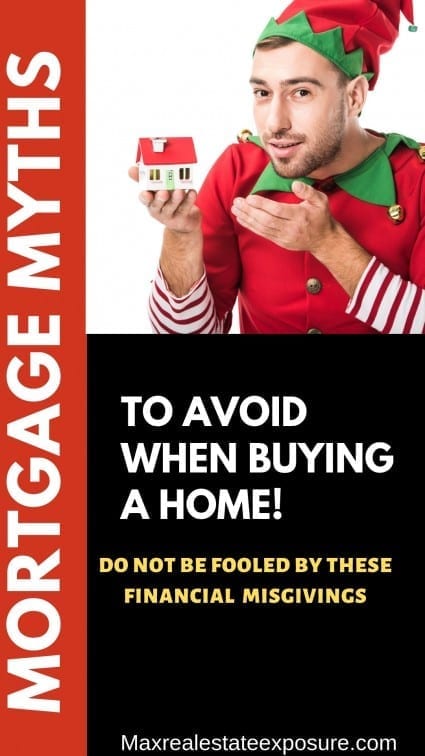Myths About Mortgages When Buying a Home
 Mortgage myths are easy to fall for when you’ve never purchased a home.
Mortgage myths are easy to fall for when you’ve never purchased a home.
If you are like most buyers, you will need a mortgage to buy a home. Unfortunately, there is a lot of misinformation out there about mortgages.
These mortgage myths can make purchasing a home even more intimidating, so learning what is true and what is not is worthwhile.
Check out the following mortgage myths to ensure you do not fall for any of them as you purchase your home. Many of these mortgage falsehoods can be avoided by finding an exceptional mortgage lender or broker to work with.
Like any other industry, the best mortgage professionals will take the time to answer all of your mortgage questions. Getting a mortgage for the first time is a huge financial step in one’s life. It comes with a lot of financial responsibility that should not be taken lightly.
It’s vital to take the time and pick a lender that offers the best mortgage rates and exceptional service. Many problems with purchasing a home can be related to a lender being lax in their responsibilities.
1. You Can’t Buy a Home if You Have No Credit or Very Little Credit.
While lenders prefer you to have good credit, some will accept applications from those with little or no credit. There are ways to check out alternative credit, so getting a mortgage may be possible anyway.
Alternative credit can be checked in various ways, like seeing if you have paid your rent on time, whether you paid your utility bills regularly, etc.
Some lenders will not accept these alternatives, but some will take them. Many buyers ask real estate agents or lenders what is a good credit score to buy a house. You can learn here.
2. You Need 20 Percent Down to Buy a Home.
One of the biggest mortgage myths is that you need a twenty percent down payment to purchase a home. If you have 20 percent down, it makes buying a home slightly easier. You get better interest rates, and many sellers will find your more significant down payment attractive.
But you should know that many buyers do not have 20 percent down. There are many options for buying homes without a twenty percent down payment. Many loan programs are available for those with less than 20 percent down, including FHA loans, VA, and USDA financing.
You can even get conventional loan financing now with only three percent down. There is a reason, however, that many borrowers strive to have a twenty percent down payment: to avoid paying private mortgage insurance, which can be a costly yearly proposition.
Most home buyers who don’t have a twenty percent down payment and are paying PMI will be conscious of ending the private mortgage insurance as soon as possible. PMI is a useless fee that does nothing for a homeowner.
The average down payment for a first-time home buyer is around 6 percent, and 12 percent for all others.
3. Twenty Percent Down Borrowers Are Better Buyers is a Mortgage Myth.
 Along with the myth of needing twenty percent down to buy a home is that having a larger down payment automatically makes you a reliable buyer.
Along with the myth of needing twenty percent down to buy a home is that having a larger down payment automatically makes you a reliable buyer.
Unfortunately, this could not be further from the truth.
Did you know plenty of multi-millionaires would instead finance as much as possible when interest rates are at rock bottom?
When money is cheap, it might make financial sense for someone wealthy to do just that. Many financial experts will tell you they would rather have their money available for investing than tied up in a home.
You should never rule out a home buyer because they have a smaller down payment. What you should do instead is research their qualifications.
Any exceptional buyer’s agent will explain their buyer’s financial qualifications when making an offer. It should be explicitly shown that a lower down payment is by choice and not a necessity.
Unfortunately, far too many real estate agents have it stuck in their heads that twenty percent down is a magic formula for home sale success.
You see this quite often when in a multiple offer situation and an agent advises their seller client to pick an offer based on a down payment.
3. Adjustable-Rate Mortgages Are Entirely Unpredictable.
There are reasons buyers prefer fixed-rate mortgages—the fixed rate means that you can predict the mortgage rate a year from now, five years from now, and ten years from now.
Adjustable-rate mortgages are variable, so they can and will change over time. However, the amount they can shift is not something the lender just pulls out of thin air.
The amount of change allowed in the interest rate is defined by the contract you sign, so it is also relatively predictable.
If you get an adjustable-rate mortgage, your contract will dictate how much the rate can change and how often. There will be a market interest rate, an index, and a margin.
The market interest rate is whatever the current rate is at the time, while the margin is how much additional interest can be charged. Most adjustable-rate mortgages are around the same rate as fixed-rate mortgages at the time.
Whether to go with an adjustable or fixed rate can depend on a few factors. The most notable two are how long you plan to stay in the home and the spread between the two rates.
For example, if you are a transferee and know you will only be in the house for a couple of years, it might make sense to go with an adjustable-rate mortgage. Of course, the rate difference should reflect your risk tolerance for rates increasing dramatically.
4. You Cannot Buy a Home With No Money Down.
 With all the new rules applied to the mortgage industry after the financial crisis, many buyers assume that buying without a down payment is no longer an option. But this isn’t true.
With all the new rules applied to the mortgage industry after the financial crisis, many buyers assume that buying without a down payment is no longer an option. But this isn’t true.
Multiple loan programs allow buyers to purchase a home with no money down. If you qualify for one of these loan programs, you can buy with no money down if you want or need to.
Two loan programs that feature no money-down options are the USDA loan program and the VA loan program. If you are interested in buying a home but do not have any money to put down on the purchase, research these programs and any others you might qualify for.
Even if you do not qualify for absolutely no money down, you may be eligible for a program where you must put very little money down.
FHA mortgages allow a down payment as low as 3.5 percent. You can also get a conventional mortgage at a three percent down payment.
However, one important thing to note is that with FHA and VA loans, the property needs to meet minimum condition standards.
Here are the property condition requirements for VA loans.
Here are the property condition requirements for FHA loans.
Look at these resources to see what the FHA and VA will accept. A buyer or seller can make the necessary repairs to bring the home up to an acceptable condition.
5. Insurance and Taxes Have to be Paid With The Mortgage.
Many buyers choose to have their lender pay the insurance company and the tax assessment when it is time to pay the insurance and tax bills. However, you do not have to agree to this arrangement if you do not want to—as long as you had put down 20 percent or more when you bought your home.
With a 20 percent down payment, you do not have to have an escrow account. When you have an escrow account with your lender, you pay your insurance and taxes through the lender.
But if you do not have to have an escrow account and you do not want to have an escrow account, you can choose to pay these bills yourself.
Some buyers choose this option because they want to keep their money in their accounts as long as possible so they can earn interest on that money.
Of course, even if you pay 20 percent down, you can still choose to have an escrow account with your lender and have the insurance and tax bill paid by your lender. It’s up to you how you want to arrange things.
6. You Cannot Get a Mortgage if You Have Bad Credit.
Most lenders prefer buyers with excellent credit. This is understandable since good credit indicates you can pay your lenders on time. However, there are lots of buyers who approach lenders with less-than-stellar credit and get loans.
The key is to show lenders that you pay your debts. Usually, you show them that you pay your debts through your credit report.
If most of the information on your credit report indicates that you pay your debts, you can most likely get a mortgage—even if there are a few dings on the report. Very few borrowers are perfect. You don’t have to be, either.
Of course, the less perfect your credit is, the more challenges you can expect to face when getting a mortgage. You may have to pay a higher interest rate or deal with other less favorable terms. But even if you have bad credit, you can still probably find a lender who will give you a loan.
Some lenders specialize in lending to people with bad credit. Bad credit home loans tend to charge more than lenders that stick to borrowers with proper credit.
Getting the best mortgage terms highlights the importance of increasing your credit score before buying a home.
Even if you have to go with an undesirable mortgage, that adverse loan will still get you into a home that is yours. And mortgages are excellent for rebuilding credit. You can restore your credit with the mortgage and get a more favorable loan later.
There are some lending institutions that specialize in giving loans to buyers who do not have stellar creditClick To Tweet. Be prepared, however, to pay a much higher interest rate on the loan as you are considered a higher risk.7. You Cannot Buy a House When You Have Student Loans.
 If your income-to-debt ratio meets the lender’s requirements, you can still get a mortgage with high student debt. Some lenders will roll student loans into mortgages, which might be an excellent option for your financial situation.
If your income-to-debt ratio meets the lender’s requirements, you can still get a mortgage with high student debt. Some lenders will roll student loans into mortgages, which might be an excellent option for your financial situation.
Like any other situation, do your due diligence.
8. Pre-Qualification and Pre-Approval Are The Same.
Pre-qualification for a mortgage is not helpful when buying a home. The standards for pre-qualification are much lower than for pre-approval.
Pre-approval requires a lot more work, but once you get that approval, you are likely to get the loan as long as nothing changes with your financial situation. Get pre-approval before you start hunting for a home.
Depending on the lender, the difference between pre-approval and pre-qualification can be dramatic. In some lending institutions, a pre-qualification is nothing more than taking a borrower’s word on the money they say they make.
With a pre-approval, on the other hand, the lender runs credit and verifies income and employment checks.
A wise real estate agent always requires a pre-approval letter when accepting an offer.
9. Pre-Approval is a Loan Guarantee.
A lender pre-approves you based on the information available at the time. If something messes with your finances, like you lose your job or take out a car loan, then when the lender goes rerunning the numbers, it will throw things off, and you will probably not get the loan.
Be careful with your finances if you have been pre-approved and are trying to buy now.
See some of the many ways your mortgage approval could get canceled if you make stupid financial mistakes. Remember, a mortgage pre-approval is not a guarantee to lend.
Having been in the real estate industry for thirty-seven-plus years, I’ve seen my share of buyers make silly mortgage mistakes that either cost them the loan or delayed the closing.
These are unpleasant problems you’ll want to avoid at all costs.
10. A Thirty-Year Mortgage is The Best Way to Go.
Without a doubt, thirty-year mortgages are the most popular. This is usually out of financial necessity, though, and not desirability.
If you asked most people if they would rather be mortgage free in fifteen years, you know the answer would be YES!
Monthly mortgage payments will be significantly higher on a fifteen-year mortgage when compared to a thirty-year mortgage. The amount of total interest paid on a fifteen year is considerably lower.
A buyer’s equity in their home naturally grows faster with a fifteen-year mortgage than with a thirty-year mortgage.
There is no right or wrong answer when picking the length of a mortgage term.
11. You Should Always Pay Off Your Mortgage as Soon as Possible.
For many people being mortgage free is worth its weight in gold. Having a massive debt like a mortgage gone can bring down your stress levels. For some folks paying off a mortgage early might not make the most sense.
There might be other debts that should be paid first, like credit card debt, student loans, etc. This is even more evident when these loans have significantly higher interest rates.
Another reason people like to pay off other debts first is because you can still deduct mortgage interest on your taxes. The bottom line is everyone’s financial situation is different.
Final Thoughts on Mortgage Myths
When buying a home, you mustn’t fall into the trap of one of these mortgage myths. Your purchase a sale will go a lot more smoothly when you have done all of your mortgage research.
Using mortgage professionals who have a track record of success is essential. The pros can put you on the right track and educate you on home-buying. You won’t have to worry about myths about mortgages when in the right hands.
Additional Helpful Home Buying Articles
- What paperwork does a lender need to give mortgage approval – see all the documents a mortgage company will need to provide mortgage approval on a home loan.
- What you should own when buying a home – do you know some of the most vital things every homeowner should have that are essential parts of home ownership? Luke Skar has you covered.
Look at these additional outstanding home-buying resources to get the most out of your next property purchase.
About the Author: The above Real Estate information on mortgage myths that are not true when buying a home was provided by Bill Gassett, a Nationally recognized leader in his field. Bill can be reached via email at billgassett@remaxexec.com or by phone at 508-625-0191. Bill has helped people move in and out of Metrowest towns for the last 37+ years.
Are you thinking of selling your home? I am passionate about Real Estate and love sharing my marketing expertise!
I service Real Estate sales in the following Metrowest MA towns: Ashland, Bellingham, Douglas, Framingham, Franklin, Grafton, Holliston, Hopkinton, Hopedale, Medway, Mendon, Milford, Millbury, Millville, Natick, Northborough, Northbridge, Shrewsbury, Southborough, Sutton, Wayland, Westborough, Whitinsville, Worcester, Upton, and Uxbridge MA.

